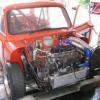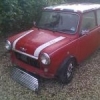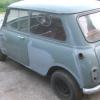Alloy Suspension Parts
#1

Posted 29 January 2013 - 12:40 PM
The mini will be for road use.
#2

Posted 29 January 2013 - 12:52 PM
Personally I'd keep the front all steel though, especially the hubs.
#3

Posted 29 January 2013 - 03:25 PM
The KAD radius arms are great and the alloy rear hubs are also nice, both suitable for a road car.
Personally I'd keep the front all steel though, especially the hubs.
Thanks Wil
Can I ask why? is it for the rigidity or strength?
#4

Posted 29 January 2013 - 03:42 PM
#5

Posted 29 January 2013 - 05:00 PM
Are they as strong as the original steel versions as they seem to be the same dimensions as the original
On the outside maybe, the standard radius arms are hollow. The cast ally ones are presumably thicker walled than standard. Specialist Components stopped making the standard suspension version of their radius arms because the knuckle cups were tearing off, they couldn't get enough aluminium around that area to make them strong enough. Gives you some idea of what you are up against. Where have you found ally top and bottom arms?
#6

Posted 29 January 2013 - 05:14 PM
On the outside maybe, the standard radius arms are hollow. The cast ally ones are presumably thicker walled than standard. Specialist Components stopped making the standard suspension version of their radius arms because the knuckle cups were tearing off, they couldn't get enough aluminium around that area to make them strong enough. Gives you some idea of what you are up against. Where have you found ally top and bottom arms?
I haven't but I work at an engineering company so was thinking of making some. I didn't realise the original radius arms were hollow. That explains alot. Alloy top arms definately won't be strong enough then as I'm sure the originals are solid.
#7

Posted 29 January 2013 - 05:16 PM
#8

Posted 29 January 2013 - 05:31 PM
you won`t gain anything out of it...
#9

Posted 29 January 2013 - 05:42 PM
but still why on a road car ?
you won`t gain anything out of it...
That's what I was thinking. Lighter suspension parts are to reduce the unsprung weight for a racing car, not for a road car. If you drive in a manner where the reduction in unsprung weight will increase performance on the road you'll soon be travelling by bus
#10

Posted 29 January 2013 - 05:59 PM
A radius arm, for instance, which is alloy will probably need to be as heavy as a steel one to get 100k miles of normal road use. Top arms are a complete no-no because of the loading, because they would have to be impossibly thick.
For safety's sake you should stick to steel. The limiting factor on the life is corrosion, as they are designed to be stressed significantly below the fatigue threshold, and so are safe for unlimited mileage.
An alloy part of the same dimensions as the original steel part is unsafe, as it will be lacking in both fatigue and static strength.
#11

Posted 29 January 2013 - 06:09 PM
The big problem with using alloy parts on a road car is fatigue, as allow does not have a fatigue threshold, unlike steel, and will always fail after a certain number of load cycles. Suspension parts designed for competition use, which generally means limited mileage, are dangerous on the road, as the fatigue life will be used up well within the lifespan of a normal road car. Badly fitted ball joints apart, suspension fractures on a normal Mini are almost unheard of, however if you use alloy parts, expect them to break. The big problem is that because the loads applied to a road car are very variable, you can't predict what the safe life will be, for example kerbing might use up half the fatigue life in an instant. Unless the designers clearly state their design load assumptions and predicted life, I would be very wary indeed.
A radius arm, for instance, which is alloy will probably need to be as heavy as a steel one to get 100k miles of normal road use. Top arms are a complete no-no because of the loading, because they would have to be impossibly thick.
For safety's sake you should stick to steel. The limiting factor on the life is corrosion, as they are designed to be stressed significantly below the fatigue threshold, and so are safe for unlimited mileage.
An alloy part of the same dimensions as the original steel part is unsafe, as it will be lacking in both fatigue and static strength.
Does this not make alloy wheels dangerous?
#12

Posted 29 January 2013 - 07:31 PM
What about the hubs?
#13

Posted 29 January 2013 - 07:46 PM
Edited by 03jkirk, 29 January 2013 - 07:48 PM.
#14

Posted 29 January 2013 - 07:57 PM
ally wheels are generally heavier than equivilant steel wheels due to the extra material
The pinned thread on "weights" confirms this.
Ironic really but true,if you want to go light get rid of your alloys& get some steelys
Although if you can find them magnesium (think i spelt that right) are lighter than both.
#15

Posted 30 January 2013 - 07:55 AM
Alloy wheels on standard production cars are a despicable cost-inflating gimmick, driven by marketing idiots with no engineering knowledge, knowing that a largely ignorant general public will be easily conned into buying them. They provide no improvement whatsoever, add weight, and really do degrade safety. Unfortunately it is often impossible to avoid them.
It follows that I would never, ever buy a second hand alloy. There is no possible way of knowing how near it is to failure. The vehicle it came from may have been regularly overloaded, and wheel fatigue life varies very strongly with vehicle weight, as well as quality of the road surface and how hard it is driven.
1 user(s) are reading this topic
0 members, 1 guests, 0 anonymous users




















